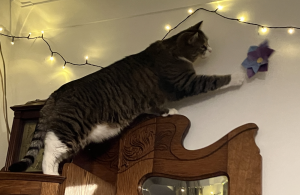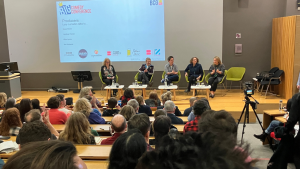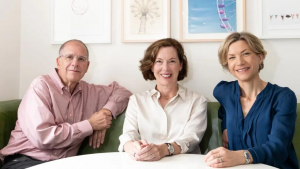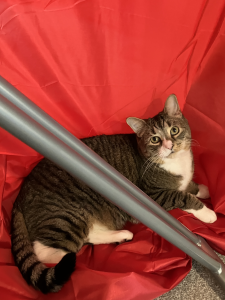Plus the London Festival of Writing, Coyote vs Acme, and Copurrnicus being Copurrnicus.
Hi there,
Catch up with Dr Dean Burnett
If you missed last week’s webinar with bestselling author Dr Dean Burnett, you can now catch up with the recording at your leisure!
Dean and I kicked off our conversation with the story of Blue Monday — not the New Order song, but the confected PR nonsense that claims one particular Monday in January is the ‘most depressing of the year’. Dean, already a keen blogger and stand-up comedian, debunked it and soon found himself writing a regular blog for The Guardian.
We then moved on to talk about how Dean came to write his first book, international bestseller The Idiot Brain and then his second book, The Happy Brain, how he does his research and how he made the decision to go full-time as a writer. We also talked about our childhood assumptions that other people wrote books, not us, and how that’s affected our writing careers, as well as Dean’s experience of doing stand-up comedy, the weirdness of having his book optioned by Whoopi Goldberg, and a bit about what he thinks writer’s block might be.
Opportunity: BBC Writers’ Studio: EastEnders
BBC Studios Drama Productions have launched a new scheme for anyone who wants to write for EastEnders.
BBC Studios TalentWorks Writers’ Studio: EastEnders is an open script call for those who are looking to take the next step in their writing career and join the ranks of the EastEnders writing team. The initiative intends to find writers with some experience, who are actively keen to pursue a career in continuing drama. The open call process will shortlist 8 writers who’ll each write one paid trial script with the full support of the in-house development editor. Of the 8 shortlisted writers, up to 5 commissioning slots will be available on the main show.
Applicants must have an existing broadcast credit, or an agent, or various other credits/experience in order to apply, and the deadline is 22 April.
The BBC also runs The Writers’ Studio: Casualty, and a similar scheme for cosy crime.
Tip-top tip: Gary Gibson on building a sustainable writing career
Sci fi writer Gary Gibson has written about the things he’s learnt as a “formerly traditionally-published author” about building a sustainable career as a writer.
Gary, who hasn’t been under contract with a major publisher since 2015, talks about the conflict that sometimes arises between what readers want and what writers want, risk-taking and experimentation, marketing and BookBub, promotion and much more.
It’s a useful post with valuable advice not just for independent authors, but for anyone interested in a writing career.
Event: The London Festival of Writing
Jericho Writers’ annual writing festival will be running over the weekend of 29-30 June, at the Leonardo Royal Tower Bridge Hotel in London. Tickets aren’t cheap, at £420 for the whole weekend, including lunch and Saturday night dinner, but excluding accommodation.
The weekend consists of seven workshop slots with three to choose from in each session, and they cover topics such as character, first chapters, working with small publishers, dealing with your midpoint plot, genre, how to write query letters and a lot more.
Watching: Coyote vs Acme might be lost forever
There’s been another wave of fury about the loss of Coyote vs Acme, the completely finished Warner Bros. Discovery movie that massive arsehole David Zaslav canned for no good reason. It was reported last month that Warner Bros. Discovery said that:
in an earnings filing it wrote off $115 million in content due to abandoning films in the third quarter of 2023 as part of a “strategic realignment plan associated with the Warner Bros. Pictures Animation group.”
Actor Will Forte, who played Wile E. Coyote, got to see the finished film and called it “incredible. Super funny throughout, visually stunning, sweet, sincere, and emotionally resonant in a very earned way.”
The film tested really well, and Amazon offered $40-$45 million for it, but that wasn’t enough for enormous wanker Zaslav, who wanted $75-$80 million for it. So, it seems Coyote vs Acme will by now have been deleted. All we have left of it has been compiled by All Things Lost into this 38 minute video:
As someone points out in the comments, “You can’t burn down your own business for insurance money. You shouldn’t be able to destroy your fully filmed, expensive project, for free money either.”
Whilst the buck stops with contemptible scumbag Zaslav, the underlying cause is perverse incentives in the tax regime. Now that despicable shitweasel Zaslav has normalised the deletion of finished films, regardless of quality or prospects, we can expect this to happen more and more often.
The only question now is whether creatives will start to shy away from, or even boycott, film studios who have shown themselves willing to destroy movies for the tax breaks.
Read this: Recently on Why Aren’t I Writing?
It’s been a while since I gave you a round-up of my newsletters over on Why Aren’t I Writing?, so for those of you who aren’t subscribed over there, here’s a bit of reading for the long weekend:
- What if the doors to the creative industry are all closed? How do we find a window to climb through?
- The paradox of originality. Trying to be original ensures you are not.
- Tell that watcher at the gates of your mind to eff off. Creativity is about radical acceptance of your first ideas and resisting the urge to second-guess yourself.
- Maybe it’s not us who are broken. Maybe it’s the system. How do we survive in an industry that that has commoditised us?
- When do you get the opportunity to really observe people? And I don’t mean through binoculars.
Grist & author webinars
This month, I organised both a Grist conversation and an author webinar with Dr Dean Burnett. I really enjoyed doing both, and I get a lot out of them, but they take a lot of time and they’re causing me quite a bit of stress. So, rather sadly, I’ve decided not to do any more webinars for a bit. Grist will become a monthly newsletter, and I’ll do another author webinar when I really can’t resist the urge any more.
Obligatory cat picture
 After the first Christmas of the pandemic, my husband and I decided to leave up the fairy lights and to then decorate the lounge seasonally. Sadly, we had to leave all the themed lights back in the US, but we are slowly rebuilding our collection of decorations here.
After the first Christmas of the pandemic, my husband and I decided to leave up the fairy lights and to then decorate the lounge seasonally. Sadly, we had to leave all the themed lights back in the US, but we are slowly rebuilding our collection of decorations here.
Copurrnicus pretty much ignored the hearts we put up for Dydd Santes Dwynwen, which is also the anniversary of our engagement, and which we left up until our wedding anniversary in February. But he has taken rather a shine to our spring decorations, which at the moment consist of eggs and paper flowers.
Grabbity doesn’t care, because none of the decorations are made of tinsel.
Right, that’s it for this time! See you again in two weeks, or on Notes or Bluesky.
All the best,
Suw
{ Comments on this entry are closed }









